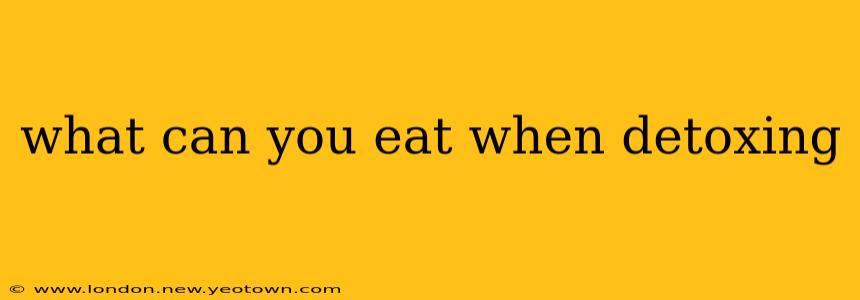What Can You Eat When Detoxing? A Delicious Journey to Wellness
The word "detox" conjures images of restrictive diets and juice cleanses, but a healthy detox is far from a starvation exercise. It's about nourishing your body with foods that support its natural cleansing processes – your liver, kidneys, and intestines are already amazing detox machines! Instead of drastic measures, focus on a balanced approach with nutrient-rich foods that promote healthy elimination and overall well-being. This isn't a quick fix; it's a lifestyle shift towards better health.
Think of it less as a "detox diet" and more as a "nutrient-rich reset." Let's explore what you can (and should!) eat during your wellness journey.
What are the best foods to eat during a detox?
This is where things get exciting! The best foods for a detox are bursting with vitamins, minerals, antioxidants, and fiber. They help your body flush out toxins naturally and efficiently. Think vibrant colors, fresh flavors, and wholesome ingredients.
-
Leafy Greens: Spinach, kale, collard greens – these are detox powerhouses! They're packed with vitamins, minerals, and chlorophyll, which acts as a natural detoxifier. Try adding them to smoothies, salads, or soups.
-
Cruciferous Vegetables: Broccoli, cauliflower, Brussels sprouts, cabbage – these vegetables contain compounds that support liver function, a crucial organ in detoxification. Roast them, steam them, or add them to stir-fries.
-
Citrus Fruits: Lemons, limes, oranges, grapefruits – these are rich in Vitamin C, a potent antioxidant that helps neutralize toxins. Add a squeeze of lemon to your water, or enjoy a refreshing grapefruit salad.
-
Garlic & Onions: These pungent allies boast sulfur-containing compounds that support liver detoxification processes. Add them to your meals for a flavorful boost.
-
Berries: Blueberries, strawberries, raspberries – these antioxidant powerhouses protect your cells from damage and support overall detoxification. Enjoy them as a snack, in smoothies, or on top of yogurt.
-
Avocado: Healthy fats are essential for detoxification. Avocados provide healthy monounsaturated fats that support liver function and nutrient absorption.
-
Ginger & Turmeric: These potent spices have anti-inflammatory properties and can aid in digestion, which is crucial for efficient elimination. Add them to teas, soups, or stir-fries.
-
Legumes: Lentils, beans, chickpeas – these are great sources of fiber, which aids in eliminating waste products from your body.
-
Water: This unsung hero is the most important part of any detox. It helps flush out toxins and keeps your system running smoothly. Aim for at least eight glasses a day.
What foods should I avoid during a detox?
While focusing on what to include is key, understanding what to limit is equally important. A successful detox involves minimizing processed foods, sugar, and unhealthy fats. These can overload your system and hinder your body's natural cleansing processes. Specifically, try to limit:
- Processed Foods: These are often laden with artificial ingredients, preservatives, and unhealthy additives that your body struggles to process.
- Refined Sugars: These contribute to inflammation and can hinder your body's natural detoxification processes.
- Unhealthy Fats: Trans fats and saturated fats found in processed foods, fried foods, and certain animal products can stress the liver and hinder detoxification.
- Alcohol: Alcohol puts extra strain on your liver, hindering its detoxifying abilities.
- Caffeine: Excessive caffeine can dehydrate you and interfere with sleep, both of which are crucial for efficient detoxification.
How long should I detox for?
There's no one-size-fits-all answer to this question. A short-term detox of a few days to a week can be a great way to reset your eating habits and feel refreshed. However, a sustained commitment to a healthy, whole-foods-based diet is the most effective long-term strategy for supporting your body's natural detoxification processes.
What are the signs that a detox is working?
You may notice improvements in energy levels, clearer skin, improved digestion, better sleep, and a reduced sense of bloating. Remember, these are gradual changes, not immediate transformations. Listen to your body and adjust your approach as needed.
Is it necessary to do a detox?
For most healthy individuals, regular healthy eating habits and lifestyle choices are sufficient. Your body is a remarkable self-cleaning machine! However, if you've been consuming an unhealthy diet or feel sluggish and overwhelmed, a short-term detox might be a helpful reset to kickstart healthier habits. Always consult with your doctor or a registered dietitian before starting any detox program, especially if you have underlying health conditions.
Remember, a detox isn't about deprivation; it's about nourishment. Enjoy the journey to a healthier, more vibrant you!

